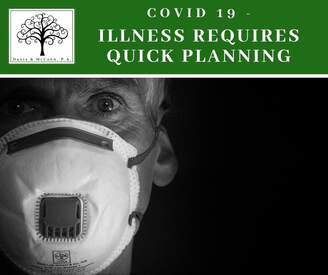 You’ve purchased the rings. The church and reception hall have been booked. The invitations have been mailed. Now, you’re just waiting for the big day to arrive. There’s enough disappointment to go around for everyone during this pandemic, but one of the biggest frustrations has to be the postponement of a wedding. If you’re one of the unfortunate individuals whose wedding has been delayed, you probably find yourself waiting for restrictions to be lifted so you can proceed with your big event. While your plans are on hold, here are some things to consider that will get your upcoming marriage off to the right start:
If you previously contacted these individuals or institutions, you may want to advise them of the change of your wedding date. Also this is not an exhaustive list, but should give you a good place to begin your new life as a married person. For more information on estate planning matters please contact Davis & McCann, P.A., Dodge City, Kansas. We are members of WealthCounsel, a national consortium of Estate Planning Attorneys, and NAELA, the National Academy of Elder Law Attorneys. We focus on providing the best legal advice on Estate Planning, Medicaid and Long-term Care Planning, Special Needs Planning, Business Formation, Family Business/Small Business Succession Planning, Probate, Trust Administration, Real Estate Transactions and related matters.  If there were ever a time to consider doing an estate plan, now would be that time. This pandemic has shown us how quickly our health and livelihood can change. If you are a parent of minor children, these facts probably keep you awake at night. Preparing a Last Will and Testament and/or a Living Trust is one of the best ways you can ensure your children will be cared for in a way you would approve, should you pass away. Without a valid plan in place at your death, your State law dictates how to divide your material possessions, who will care for your minor children (in the absence of a surviving spouse), what age those children will receive access to their inheritance, and who will be responsible for selling or distributing your items of value. Despite these risks, most young adults don’t have even a basic Will. Megan L. McCann, estate planning attorney and partner at Davis & McCann, P. A., attributes this trend to two facts: One, young adults rarely consider the possibility of death and two, many people assume they have insufficient assets to require estate planning. If you have children, McCann says having at least a simple Will is critical, if for no other reason than to name a guardian (the person who will provide physical shelter and care for your child) and a conservator (the person who will manage the money your child may inherit) for your minor children. “In the absence of a Will where you appoint a guardian and conservator, the State will decide who should care for your children and their assets after your death,” McCann says. She continues, “Part of our responsibility as parents is to protect our children and provide a safe future for them. By naming a guardian and conservator in a Will, you can control who provides that protection and safety for your children and their assets, if you no longer can.” It also is a good idea to name an alternate guardian and conservator under your Will in case your original choice is unable or unwilling to act. Please be advised that the conservator need not be the same person as the guardian. Try to select individuals who you think exhibit the optimal skills for the position that you are appointing them for and whom you feel would make decisions that most closely mimic your own parenting style. It is always a good idea to get the advanced consent of the prospective guardian and conservator to ensure that they are willing to assume such a large responsibility prior to naming them in your Will. Be aware you can always revise your documents in the future to change the guardian and conservator at any time. For more information on Estate Planning, contact Davis & McCann, P. A., Dodge City, KS. We are members of Wealth Counsel, a national consortium of Estate Planning Attorneys and focus our practice on providing clients with the best legal advice on estate planning, Medicaid and Long-term Care Planning, Special Needs Planning, Family Business/Small Business Succession Planning, Probate, Trust Administration, Real Estate Transactions, and related matters.  Q: I am married with four children and I haven’t done any estate planning. I have serious health issues and I’m concerned I won’t have time to do thorough estate planning before I die. I own a home, some investments, a bank account, two insurance policies, and a couple of vehicles. Is there a quick way I can preserve my assets for my family? A: Obviously if you had more time, you would want to do more sophisticated estate planning, perhaps looking at ways to save on taxes or protect your children from the risk of losing their inheritance due to divorce or creditors. However, given that your health issues require you to make emergency decisions, here are a few options for you to consider: 1. Execute a simple Last Will and Testament. Your local estate planning attorney can customize the Will to your specific wishes. This document will help transfer any of your assets that do not have a Payable-On-Death or Transfer-On-Death designation. Given a medical emergency, it’s not unusual to accomplish this in days, rather than weeks. Use caution when considering online estate planning services, as most use a “one size fits all” approach. Rarely do these services adequately address your specific family needs. 2. Sign a Durable General Power of Attorney and a Health Care Power of Attorney to authorize a person whom you trust to make your business and health care decisions should you no longer be able to. With serious illness, it is not unusual for a person to be unable to speak or  The Coronavirus pandemic has forced many individuals to quarantine and work from home. A productive way to spend the extra time you may now find in your schedule is to create an estate planning portfolio. By gathering all of your pertinent estate planning information into one location, you’ll make visits to your estate planning attorney, investment advisor, tax accountant, and insurance agent much easier. To help get you started, we’ve put together a guide to organize your estate planning portfolio. SECTION A: CURRENT ESTATE PLANNING DOCUMENTS • Copies of any currently existing estate planning documents, including any powers of attorney for financial or medical, living will, HIPAA, Last Will and Testament and any trust documents. SECTION B: ASSETS Bank Accounts: • Copies of your most recent statements for all checking, savings and money market accounts. • Copies of certificates of deposit. Investment and Mutual Fund Accounts: • Copies of your most recent statements for all investment and mutual fund accounts. Stock and Bond Certificates: • Copies of all stock certificates. • Copies of all bonds.  The Coronavirus pandemic has forced families to think about topics they might generally avoid; serious illness and death. Because the virus doesn’t always present symptoms in the early stages, those who are struck with a severe form often do not have time to prepare their business and legal affairs before requiring medical intervention. What can you do now to ensure that your legal and financial matters are in order? Below are some recommendations on what you or your loved one can do to keep your home and business running smoothly in case you are hospitalized or otherwise unable to act on your own: 1. Review your Health Care Power of Attorney (HCPOA). This document allows someone to make your health care decisions in the event you are unable to. You may name one or more individuals whom you trust to act as your agent(s). We recommend that you name at least one alternate agent, should your first agent be unable or unavailable to make decisions on your behalf. If you become mentally competent and able to communicate with your doctor, the authority of your HCPOA agent ceases. 2. Review your General Durable Power of Attorney (GDPOA). This document is often referred to as a business or financial power of attorney. Your agent can pay your bills, file your taxes, and conduct your ordinary business affairs. Similar to the HCPOA, you may name one or more individuals whom you trust to act as your agent(s). Again, we recommend that you name at least one alternate agent, should your first agent be unable or unavailable to make decisions on your behalf. |
NEWS YOU CAN USEDavis & McCann, P. A., Archives
April 2021
Categories
All
|

 RSS Feed
RSS Feed